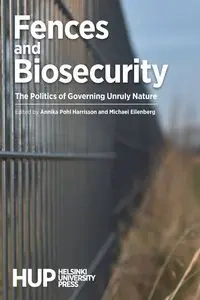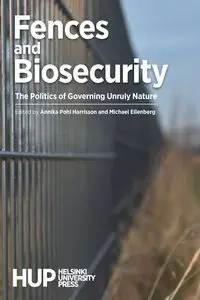Fences and Biosecurity - Harrisson Annika Pohl
- The Politics of Governing Unruly Nature
Fences and Biosecurity explores the role of fencing as a mechanism of control, exclusion, and power in the name of biosecurity. While biosecurity is broadly understood as the set of measures taken to prevent the introduction and spread of harmful organisms - thereby protecting humans, animals, and plants - this volume critically examines how fencing has become a key tool in these efforts. Through an interdisciplinary lens, the chapters reveal the ways in which fences, both physical and symbolic, shape social, political, and ecological landscapes.
This volume brings together scholars from different regions to investigate the ways in which biosecurity fencing is deployed across different contexts in Europe and North America. As fencing practices increase in scope and intensity, it becomes imperative to assess their effects - both intended and unintended - on human and non-human life. More than passive structures, fences actively participate in the governance of space, reinforcing borders, and regulating mobility. They embody biosecurity concerns, turning abstract discourses into tangible barriers that impact everyday life. Yet, fences are not merely practical tools; they also serve as powerful symbols of fear, control, and exclusion. While they may provide protection, they also create division, evoking a range of intellectual and emotional reactions and raising questions about their long-term implications.
Fences and Biosecurity highlights how fencing, as a manifestation of biosecurity anxieties, is not only about managing biological threats but also about organizing the world into hierarchies of value. By delineating spatial boundaries, fences impose distinctions between what is considered safe and what is framed as dangerous or invasive. This separation of differently valued species and biological matter is not neutral; rather, it is deeply entangled with political imaginaries, economic interests, and global trade dynamics. Fences facilitate the circulation of capital while simultaneously restricting the movement of certain species and populations, making them instruments of governance rather than mere physical barriers. While fences physically separate spaces, they also reshape cultural understandings of risk, security, and belonging. By shifting the focus from biosecurity as an abstract policy concern to fencing as a material and discursive practice, this volume reveals the ways in which security measures are enacted on the ground.
Annika Pohl Harrisson is a postdoctoral researcher at the University of Southern Denmark.
Michael Eilenberg is an associate professor of anthropology at Aarhus University.
EAN: 9789523691247




Fences and Biosecurity explores the role of fencing as a mechanism of control, exclusion, and power in the name of biosecurity. While biosecurity is broadly understood as the set of measures taken to prevent the introduction and spread of harmful organisms - thereby protecting humans, animals, and plants - this volume critically examines how fencing has become a key tool in these efforts. Through an interdisciplinary lens, the chapters reveal the ways in which fences, both physical and symbolic, shape social, political, and ecological landscapes.
This volume brings together scholars from different regions to investigate the ways in which biosecurity fencing is deployed across different contexts in Europe and North America. As fencing practices increase in scope and intensity, it becomes imperative to assess their effects - both intended and unintended - on human and non-human life. More than passive structures, fences actively participate in the governance of space, reinforcing borders, and regulating mobility. They embody biosecurity concerns, turning abstract discourses into tangible barriers that impact everyday life. Yet, fences are not merely practical tools; they also serve as powerful symbols of fear, control, and exclusion. While they may provide protection, they also create division, evoking a range of intellectual and emotional reactions and raising questions about their long-term implications.
Fences and Biosecurity highlights how fencing, as a manifestation of biosecurity anxieties, is not only about managing biological threats but also about organizing the world into hierarchies of value. By delineating spatial boundaries, fences impose distinctions between what is considered safe and what is framed as dangerous or invasive. This separation of differently valued species and biological matter is not neutral; rather, it is deeply entangled with political imaginaries, economic interests, and global trade dynamics. Fences facilitate the circulation of capital while simultaneously restricting the movement of certain species and populations, making them instruments of governance rather than mere physical barriers. While fences physically separate spaces, they also reshape cultural understandings of risk, security, and belonging. By shifting the focus from biosecurity as an abstract policy concern to fencing as a material and discursive practice, this volume reveals the ways in which security measures are enacted on the ground.
Annika Pohl Harrisson is a postdoctoral researcher at the University of Southern Denmark.
Michael Eilenberg is an associate professor of anthropology at Aarhus University.
EAN: 9789523691247

